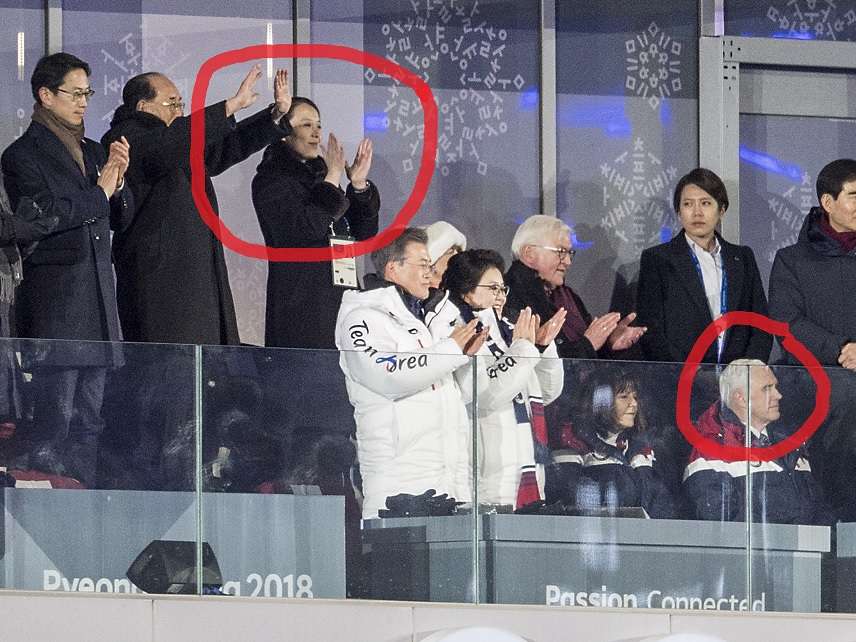Why It's a Good Thing We're Fighting Over Coverage of Kim Jong Un's Sister
The Olympics-and nation-states-are less important than ever to our lives and geopolitics.

"North Korea has emerged as the early favorite to grab one of the Winter Olympics' most important medals: the diplomatic gold." So declared Reuters after the Winter Olympics' opening ceremony, during which Kim Yo Jong, the sister of North Korean dictator Kim Jong Un, waved a lot while seated behind U.S. Vice President Mike Pence. "Without a word, only flashing smiles, Kim Jong-un's sister outflanked Vice President Mike Pence in diplomacy," tweeted The New York Times.
It was younger media outlets and personalities such as Buzzfeed and CNN's Jake Tapper that called bullshit on such stories. Buzzfeed insisted Kim Yo Jong was "a garbage monster" and asked, "What the hell is wrong with you people?" Tapper tweeted, "If you hate US leaders more than you hate the Kim Jong-un regime, you really need to read up on North Korea" and supplied a link to Human Rights Watch's analysis of North Korea.
Fox News contributor Stephen Miller (not THAT Stephen Miller) tweeted:
Reuters looked strong in bringing home the gold for North Korea today but coming through late, the New York Times. Think Progress will have to settle for the bronze #olympics pic.twitter.com/fIEoqmTs37
— Stephen Miller (@redsteeze) February 11, 2018
At the New York Post, Bethany Mandel laid into what she called "the perverse fawning over brutal Kim Jong Un's sister at the Olympics" even as NBC fired opening-cermonies analyst Joshua Cooper Ramo for having himself fawned over the Japanese economy during the Games' first big night. "Ramo said that 'every Korean' respected Japan for their recent achievements as a nation, insinuating that South Korea had forgotten about the 35 brutal years of Japanese rule that ended after World War II," said The Hollywood Reporter, which incensed South Korean residents and officials. NBC failed to catch the gaffe before Ramo's comments aired 14 hours later on tape delay in the U.S. and announced that "it was 'grateful' Pyeongchang's organizing committee accepted its apology."
And so it goes. This sort of side drama, which doesn't involve anything about sports, is what the Olympics has always done best. We should never forget that the modern Games were explicitly created as a showcase for nationalism, not individual achievement. That's why athletes compete for their countries of birth (or, increasingly, whatever country gives them the best chance of getting to compete). As journalism professor and historian Michael J. Socolow reminded Reason readers just a few days ago, "Sports, and sport broadcasting, can never be apolitical when nations are going head-to-head on the field of play." Indeed, the French aristocrat who restarted the Games in the late 19th century, Pierre de Coubertin, "figured his country could better avenge its ass-whupping in the Franco-Prussian War on playing fields rather than battlefields." Which leads to statements such as this one:
"What's the difference between propaganda for tourism - like in the Los Angeles Olympics of 1932 - or for a political regime?"
-Baron de Coubertin responding to criticism that 1936 Berlin Games were exploited to make Nazis look good https://t.co/lG7Li0cMHO— Michael Socolow (@MichaelSocolow) February 12, 2018
The good news in all of this? Overall viewership for the Olympics is in decline. At least in the United States, we seem to care less and less about nationalist spectacles, at least when they appear outside of our nation's borders.
Garnering a 13.8 in metered market results for Saturday's primetime coverage of the official Day 1 of the XXIII Winter Olympics, the network was down just over 9% from the first day of Sochi just over four years ago. That February 8, 2014 night of tape-delayed coverage was even with the first official day of the Vancouver Winter Olympics back in 2010.
With the overall viewership numbers just in, last night's Day 1 coverage on NBC snared an audience of 21.4 million from 8 – 11:10 PM ET. That's down 15% from what the first day of Sochi delivered four years ago and a drop of 20% from the first official day of the 2010 Winter Games in Vancouver.
The trend for Olympics viewership, both winter and summer is clearly down. There are many reasons why we care less and less about the Olympics (I list some of them here), but I'd argue that the best and most important one is that, even after 9/11 and with all the current trouble in the world, we live in a much-better and less-nationalistic world. Athletic competitions, even ostensibly stupid ones (we miss you, ski ballet!), are often thrilling and over the years, the Olympics generated fantastic narratives of triumph-over-adversity like nothing else (read about U.S. hammer throw champ Hal Connolly and Soviet discus gold medalist Olga Fikotová; there are hundreds of such stories). But we've all got a lot more going on in our lives these days and, really, who cares about avenging the Franco-Prussian War or the Cold War? The planet is more at peace than it used to be and while it's easy (and right) to be angered by powder-puff coverage of a murderous dictator's sister, that sort of outrage, like global poverty, is in blessedly steep decline.
Related: "5 Cities that Got F*cked by Hosting the Olympics"


Show Comments (91)